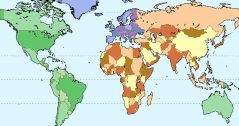|
|
| COMPANIES |
Discover the reality of companies and brands!
|
| TRANSNATIONALE.ORG |
| Free and independant information on large corporations |
Home >JordanEconomy, tax incentives & labor conditionsThe ITUC report particularly criticises the lack of substantial progress on workers' rights and working conditions in the export processing zones in Jordan, called qualified industrial zones (QIZs). Mistreatment is common practice, including long working hours without payment of overtime, abusive conditions and violations of workers' rights. Many workers in QIZs are migrant workers who are excluded from protections in the labour law and do not have the right to organise.
Abuses against many Asian women who migrate to work as domestic workers in Jordan persist. They are subject to forced conditions of work, withholding of passports, restrictions on movement, abusive treatment, non-payment of wages, threats and physical or sexual abuse, long working hours, and high deductions for food and shelter.
The report also refers to issues related to child labour, discrimination and forced labour. It notes that child labour is prevalent in Jordan, including in informal work in agriculture and domestic work in addition to a growing number of street children. Rights of working children are violated as 70% of them earn less than the minimum wage and almost half work more than nine hours per day. While forced labour exists in the Qualified Industrial Zones and among migrant workers in domestic work, agriculture and construction, the report states that trafficking of people for forced labour is a major issue.
There are still many restrictions on Jordanian workers’ trade union rights, including the continued single union system. The ever increasing number of migrant workers still have no union rights.
On 3 August 2006, ten workers at the Turkish factory Atateks who had started and led a protest that had brought an improvement in working conditions and wages a few weeks earlier were taken to the police station in a vehicle owned by the management, on the pretext of escorting them to Amman to get their residence permits. Having warned their colleagues of their arrest by mobile phone, which sparked off a demonstration, the ten workers were beaten up and stripped of all their clothes. On 6 August they were expelled from the country, without even being allowed to collect their belongings. The authorities explained that they had been sacked by their manager and deported since they represented a threat, but refused to go into further details. On 2 September 2006, a dispute at the Palestinian factory Silver Planet had a similar outcome: the ten workers representing the 500 Bengali staff were deported, also following imprisonment.
Several strikes involving Asian workers broke out in assembly plants in Export processing zones in 2006, but brought little benefit to the workers, who were often suffering from appalling working conditions and the threat of deportation.
Minimum wage noted (US$/day)
2006 111 US$/day at/for Target Corp |
translate this page in arabic chinese dutch german japanese korean russian
Legal notice © T&C 1999-2010
| CONTRIBUTIONS |

